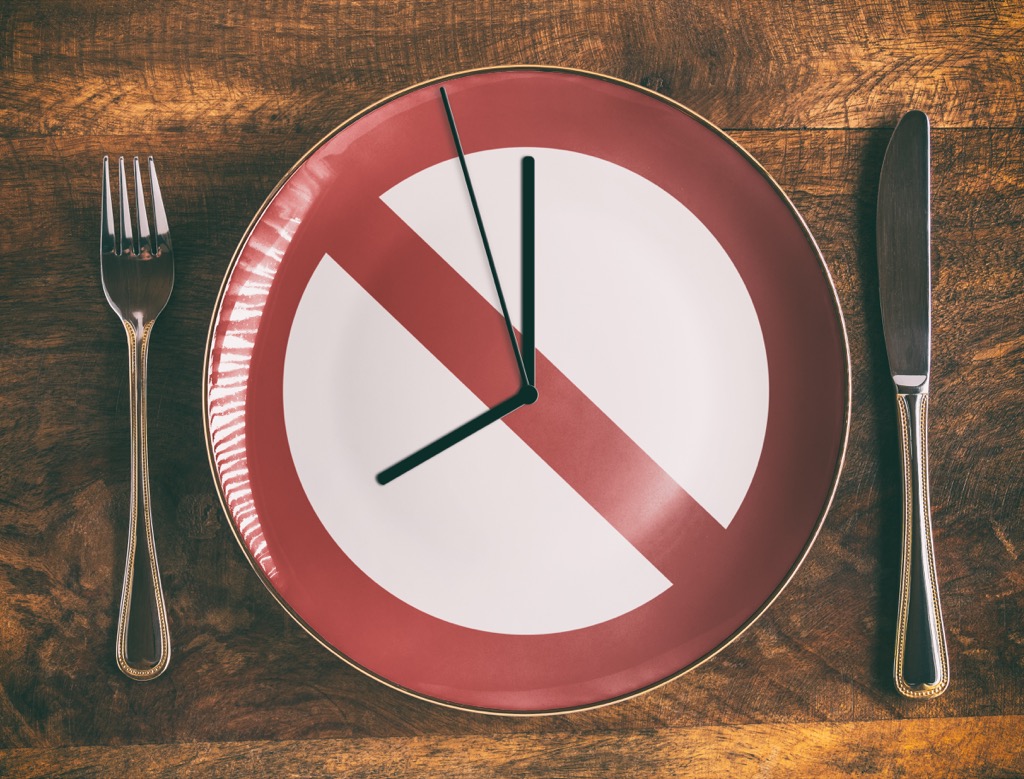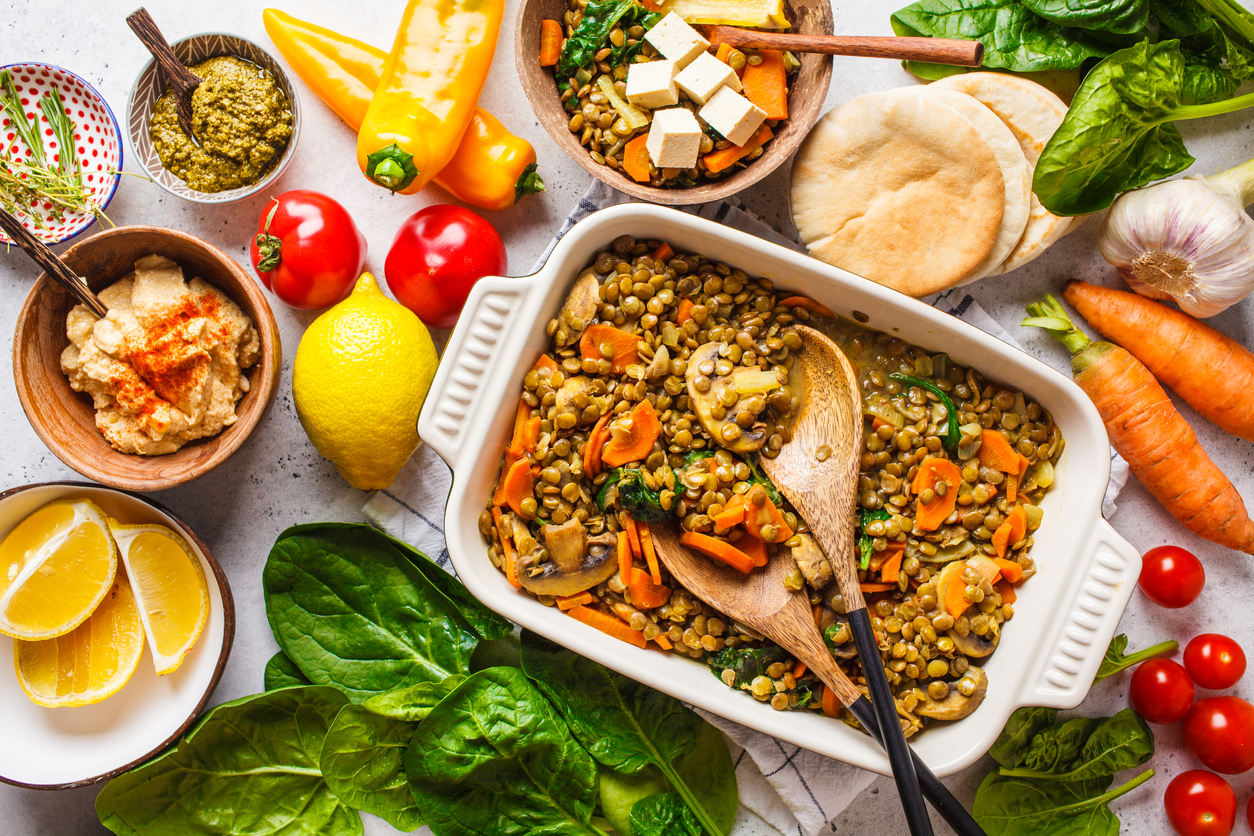Why Eating Small Meals More Often Is Better Than Intermittent Fasting, New Study Says

If you’re looking to lose weight and boost your health, experts agree that the key is to stick to a plan that’s slow and sustainable. And while there’s no one-size-fits-all diet that will ensure you reach and maintain a healthy weight, research shows that some plans tend to be more successful than others.
A January study published in the Journal of the American Heart Association (JAHA) recently compared two popular weight loss methods—intermittent fasting and eating smaller, more calorie conscious meals—and found that eating smaller meals more often appears to be more effective than time-restricted eating. Read on to learn why this method is linked with long-term results, and to find out what’s best to put on your plate.
READ THIS NEXT: Snacking on This Helps You Lose Weight and Sleep Better, New Study Says.
Intermittent fasting has gained major popularity in recent years.

Intermittent fasting, an eating schedule in which you consciously alternate fasting and eating windows, is an increasingly popular weight loss method. Its proponents say that by restricting when you eat rather than what you eat or how much, you can limit your calorie intake without sacrificing your favorite foods.
Though some people take intermittent fasting to unhealthy extremes, certain experts say that choosing longer eating windows could help curb late night snacking and other unhealthy eating habits. Christie Williams, MS, RDN, a Johns Hopkins dietitian, says that looking back to 50 years ago, “there were no computers, and TV shows turned off at 11 p.m.; people stopped eating because they went to bed. Portions were much smaller. More people worked and played outside and, in general, got more exercise. Nowadays, TV, the internet and other entertainment are available 24/7. We stay awake for longer hours to catch our favorite shows, play games, and chat online. We’re sitting and snacking all day—and most of the night,” she said while speaking with Johns Hopkins health blog.
READ THIS NEXT: 7 Medications That Could Be Making You Gain Weight, Pharmacists Say.
Eating small meals is better for weight loss than intermittent fasting, a new study says.

Though many people have achieved weight loss through intermittent fasting, the JAHA study concluded that eating smaller meals may actually be more effective for weight loss than time-restricted eating. That’s because people who tried intermittent fasting were more likely to eat a greater number of medium (500-1,000 calorie) or large (1,000+ calorie) meals during their eating window, making them more likely to gain weight over the study’s six-year research period.
In fact, they found that the length of a subject’s eating window had no impact on their weight. Instead, the size, frequency, and total calorie intake associated with meals were linked with changes in body mass index (BMI).
This appears to hold true even if you eat more frequently.

The researchers also noted that eating more frequently doesn’t seem to undermine long term weight loss results if your meals are kept smaller. In fact, many experts say that eating smaller meals more frequently can be a sustainable way to get the nutrients you need and feel satiated throughout the day, while ultimately keeping your calorie count low.
“Skipping meals may seem like a good way to lose weight, but in reality, it can be detrimental to your health and metabolism,” explains Gabriela Rodríguez Ruiz, MD, PhD, FACS, a board-certified bariatric surgeon at VIDA Wellness and Beauty. “Starving yourself can lead to intense hunger cravings and eventual binging, as well as increased fatigue and mood swings. To avoid this, make sure to eat regular meals throughout the day and snack in between, focusing on nutritious foods that will keep you feeling full for longer,” she tells Best Life.
For more health news sent directly to your inbox, sign up for our daily newsletter.
For better health, focus on eating whole, plant-based foods.

When it comes to your health, what you eat is likely more important than eating a particular number of calories or eating at particular times. To make the most of your diet, focus on taking in nutrient-rich, plant-based foods, while minimizing processed foods, saturated fats, salt, and added sugar. Specifically, you should load up your plate with whole grains, fruits, veggies, and healthy oils. Lean protein sources such as chicken, fish, legumes, and nuts are also important parts of a healthy and balanced diet.
“For heart health protection, your diet needs to focus on the quality of plant foods, and it’s possible to benefit by reducing your consumption of animal foods without completely eliminating them from your diet,” explains Ambika Satija, MD, of the Department of Nutrition at the Harvard T.H. Chan School of Public Health. “A moderate change in your diet, such as lowering your animal food intake by one to two servings per day and replacing it with legumes or nuts as your protein source, can have a lasting positive impact on your health,” she told Harvard Health Publishing.
If you’re concerned about your weight, speak with a doctor, dietician or nutritionist to learn more about what weight management plan may work best for you.